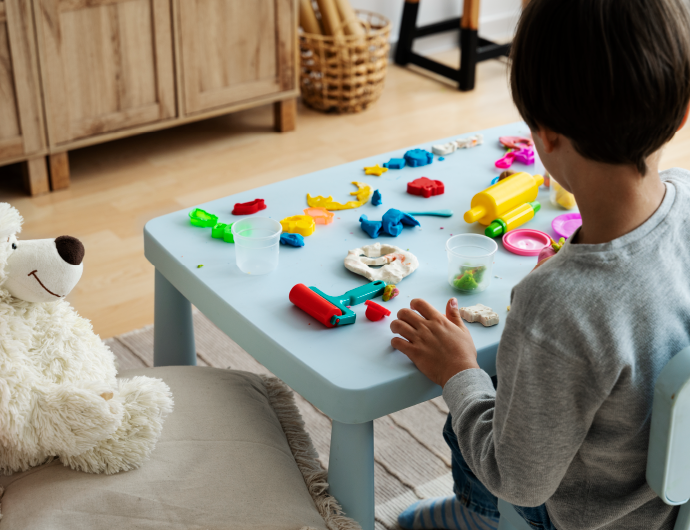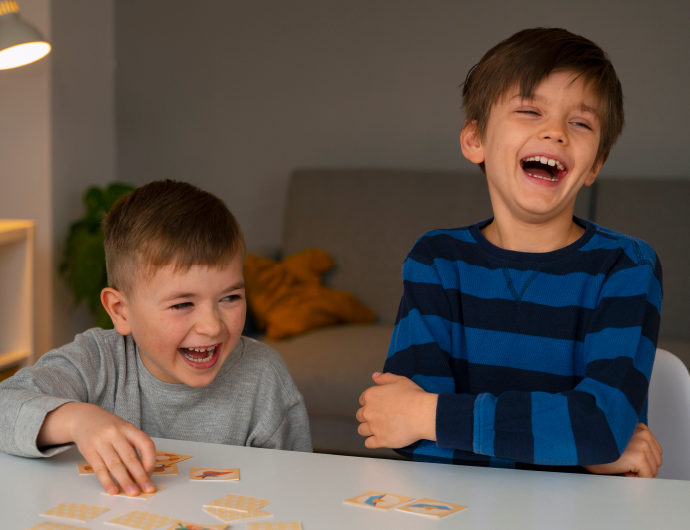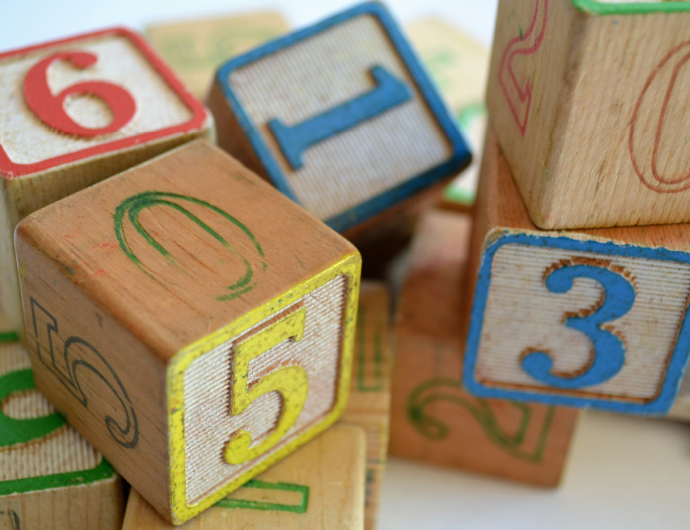BACK

As Singaporean parents, we often seek the best for our children, from nutritious meals to meaningful learning experiences. But did you know that some of the most effective cognitive development happens during play?
Cognitive development extends beyond reading and counting. It involves nurturing a child’s ability to think critically, solve problems, sustain attention, and articulate ideas with confidence.
One of the most effective ways to support this? Purposeful play and structured games.
In this guide, we’ve grouped ten smart, age-appropriate games by the specific developmental skills they nurture.
Whether your child is a budding problem-solver, storyteller, or strategist, you’ll find practical, play-based ideas to support their growing mind—all while having fun together. It’s a concept embraced in leading early education settings—including preschools like Little Skool House—where play is purposefully designed to spark lifelong learning.
Let’s explore how intentional play can build the cognitive foundations your child needs most.
Benefits of Cognitive Games

Cognitive games are a fun and effective way to support children’s mental development. These games help improve problem-solving, creativity, and overall cognitive function, preparing kids for lifelong learning and success.
By engaging in cognitive games, children also develop important skills that benefit their academic and personal growth.
- Improved Problem-Solving Skills. Encourages critical thinking and decision-making.
- Enhanced Memory Recall. Strengthens both short-term and long-term memory.
- Better Attention and Focus. Supports concentration, which helps with learning.
- Boosted Creativity. Stimulates innovative thinking and creative expression.
These games lay the foundation for cognitive development, making learning both enjoyable and effective.
🧠 Games That Build Problem-Solving Skills

Developing strong problem-solving abilities at an early age is crucial. It teaches kids how to approach challenges with confidence and creativity, encouraging them to find solutions independently.
Incorporating brain games into the classroom environment can significantly enhance student engagement and learning. These games encourage children to think critically, plan, and evaluate options, all while keeping things fun and engaging.
Tangram Puzzles
Skill Focus: Spatial awareness, creative problem-solving
Suggested Age: 5–8
Tangram puzzles involve arranging geometric shapes to form specific patterns and are fantastic for building spatial awareness and creative problem-solving skills. Whether using traditional wooden sets or digital puzzle apps, these games challenge kids to think about how shapes fit together and encourage imaginative thinking.
Parent Tip: Offer guidance if your child struggles, but let them explore different combinations on their own. This fosters independence in solving problems while enhancing their ability to think critically.
Logic Board Games
Skill Focus: Strategic thinking, planning ahead
Suggested Age: 6–10
Games like Rush Hour or Mastermind require children to think strategically and plan to reach a solution.
In Rush Hour, kids must navigate cars through a gridlocked traffic jam using logical steps, while Mastermind challenges them to deduce a hidden colour code through reasoning and deduction.
Parent Tip: Start with simpler versions of these games and gradually introduce more complex levels as your child becomes more skilled. Discuss the strategies they used to solve problems and encourage them to think about alternative solutions.
🧩 Games That Sharpen Memory and Attention

Memory and attention are foundational cognitive skills that shape how children process information, learn new concepts, and stay engaged in activities. These games help boost your child’s ability to remember details, focus for longer periods, and develop strong visual recall, essential for academic success and daily tasks.
Memory Matching Games
Skill Focus: Short-term memory, visual recall
Suggested Age: 4–7
Memory matching games are perfect for sharpening a child’s short-term memory and attention to detail. Whether it’s traditional card-matching games or memory games, these activities challenge kids to pay close attention to what they see and retain that information.
Parent Tip: Look for short, repeatable games which work well for younger children. These games can be played multiple times, which helps them develop a longer attention span and keeps the fun going.
Interactive Logic Puzzles
Skill Focus: Pattern recognition, sustained attention
Suggested Age: 6–10
Interactive logic puzzles, like Sudoku or pattern recognition games, are designed to test a child’s ability to focus on a task and identify patterns. These puzzles encourage kids to look for logical solutions while maintaining attention over a period, which is a great way to build sustained concentration.
Parent Tip: If your child gets distracted, guide them through the puzzle and help them break it down into smaller, more manageable steps. Encourage them to complete the puzzle without rushing, and reward their persistence to keep them motivated.
🔢 Games That Strengthen Mathematical Thinking

Mathematical thinking isn’t just about numbers; it’s about recognising patterns, solving problems, and using logic. These games help children strengthen their numerical skills, boost their ability to think critically, and even foster a love for math through fun challenges.
Math-Based Brain Teasers
Skill Focus: Numerical problem-solving, pattern recognition
Suggested Age: 5–9
Brain teasers that involve numbers, like arithmetic puzzles or number riddles, are an excellent way to engage kids in mathematical thinking. Kids must figure out solutions to these puzzles, which helps them develop critical thinking skills.
Parent Tip: Keep math fun by offering rewards for solving puzzles. Use these games as a way to show how math applies to real-life situations, like counting coins or measuring ingredients for a recipe.
Building Block Games with Number Integration
Skill Focus: Shape recognition, logical reasoning
Suggested Age: 4–8
While not traditionally math-based, games involving building blocks can integrate basic mathematical concepts such as counting, symmetry, and measurement. Kids can use LEGO sets or pattern blocks to build structures and understand geometric shapes, while also counting pieces or exploring simple ratios.
Parent Tip: Encourage your child to count their blocks or create patterns based on mathematical rules. This informal integration of math will make it fun without feeling like formal learning.
🗣️ Games That Boost Language & Vocabulary Skills

Strong language skills form the basis for effective communication, comprehension, and academic success. These games help children expand their vocabulary, improve spelling, and foster creative thinking. Plus, they make learning words and phrases an interactive and enjoyable experience.
Word Games (Crosswords, Word Searches, Story Prompts)
Skill Focus: Vocabulary expansion, spelling, creative thinking
Suggested Age: 6–10
Word-based games, like crosswords and word searches, can be tricky and challenge kids to explore new words while reinforcing their spelling skills. These games are also great for developing cognitive flexibility, as kids think critically about where words fit and how they can use them in different contexts.
Parent Tip: Turn word games into a daily routine. Have a crossword puzzle ready in the morning or challenge your child to come up with a story using five new words they learned from the game.
Storytelling & Imagination Games (Story Cubes, Role-Playing)
Skill Focus: Narrative skills, imagination, verbal communication
Suggested Age: 5–8
Storytelling games, such as story cubes or role-playing activities, inspire children to create their own stories and express ideas in a coherent narrative. For example, a child might pretend to be a mother, taking care of their ‘children’ and making decisions for the family.
These activities encourage children to think critically, expand their vocabulary, and refine their verbal communication skills.
Parent Tip: Join in on the storytelling fun. You can take turns adding to the story or even use props to make the experience more engaging. This turns it into a bonding activity while helping your child develop language skills.
🎨 Games That Inspire Creative Thinking & Imagination

Creative thinking isn’t just about being artistic—it’s about problem-solving, exploring new possibilities, and using imagination to approach challenges. These games allow children to think outside the box, express themselves freely, and develop a deeper sense of creativity and self-expression.
Creative Storytelling Activities (Story Cubes, Picture Prompts)
Skill Focus: Imagination, narrative development, verbal expression
Suggested Age: 5–8
Storytelling activities like story cubes or picture-based prompts encourage children to tap into their imagination and create unique stories.
These games help a person develop their narrative skills while also allowing them to experiment with language, sequencing, and creativity. Children get to explore different characters, settings, and plots, enhancing their ability to think creatively and communicate clearly.
Parent Tip: Help your child create a “storyboard” with drawings, cut-outs, or other materials to visually organise their ideas. This makes the storytelling experience interactive and tangible, promoting deeper creativity.
Role-Playing & Pretend Play
Skill Focus: Imagination, problem-solving, social-emotional development
Suggested Age: 4–8
Role-playing games, where children take on different roles and scenarios, help them develop empathy, problem-solving, and social skills. Whether they’re pretending to be doctors, superheroes, or animals, role-playing stimulates creative thinking and lets children explore different perspectives. It also fosters collaboration and teamwork when played with others.
Parent Tip: Create an “imagination box” filled with costumes, props, and materials that inspire different roles. Encourage your child to pick a theme and act it out. You can join in too, making it a fun and bonding experience!
Extending Cognitive Learning Beyond Home

Cognitive games play a crucial role in your child’s development, offering them opportunities to enhance their problem-solving, memory, creativity, and focus.
But the benefits of these games don’t have to stop at home.
Cognitive development can continue to thrive within a structured educational setting, like at Little Skool House.
At Little Skool House, cognitive learning isn’t just a fun, occasional activity—it’s embedded into our daily preschool curriculum. Our classrooms are designed to foster critical thinking, creativity, and problem-solving, with activities that encourage children to think independently, collaborate with others, and explore new ideas.
Whether it’s through strategic games, memory challenges, or hands-on creative projects, Little Skool House provides a supportive, playful environment where children can continue their cognitive growth.
By blending play-based learning with structured guidance, we ensure that each child has the tools they need to build strong cognitive skills that will serve them both academically and personally in the years to come.
If you’re looking for a preschool where cognitive development is central to the curriculum, Little Skool House is the perfect place for your child to thrive. Join us today to learn more about how we make learning both fun and impactful!



